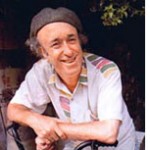By Dan Bloom

CHIAYI CITY, Taiwan –Jewish writers did not invent science fiction, but they played an important part in its evolution as both editors and foot soldiers.
David Brin, one of America’s top sci-fi novelists and the author of “The Postman,”once told me that the Hollywood film “Soylent Green’’ was based on Harry Harrison’s novel Make Room, Make Room!‘ Harrison, I later found out via one of my Google searches from my cave in Taiwan, was Jewish on his mother’s side.
His mother, Ria Harrison, nee Kirjassoff, was born in Latvia and grew up in Russia His uncle, Max David Kirjassoff, served as an American consul in Japan, but he died during the 1923 Tokyo Earthquake.
Here’s a humorous Jewish sci-fi story:
“On Venus, Do We have a Rabbi” was short story that was part of a collection edited by Jack Dann, called Wandering Stars: An Anthology of Jewish Fantasy and Science Fiction. The stories were written by Jewish writers Ellison, Effinger, Asimov, Silverberg and others. Funny story and true:
Many people don’t know this, but the short story “On Venus, Do We Have a Rabbi” should be read or spoken as a question and as not a statement. In other words “On Venus, Do We Have a Rabbi?”
Now I need to get serious for the rest of this column.
It’s not everyday that a big fat book arrives in my mailbox in Taiwan, especially a big fat academic tome that taxes my failing eyesight.
But I’m glad this one made it safely across the seas from where it was published. The notes up front say it comes from a university press in Virginia.
The acknowledgment page lists an entire army of people who helped the author turn a popular academic paper into a what very well might become a very important book about climate and literature, the Anthropocene period we now live in and the very future of humankind.
Meet Adam Trexler. He went to college in Maryland and got his advanced degrees in London. Now he makes his home in Oregon, writes academic papers about climate change and thinks about ways of making gold-valued dollar bills with a company he works for called Valaurum.
Trexler’s accomplishment? He has single-handedly taken a monograph he published online in 2011 and turned it into perhaps the most important nonfiction book of 2015.
I can envision literary critics from the New York Times to the New York Review of Books arguing over this time for months, years. British book critics like Alison Flood and Pilita Clark will be waxing either enthusiastic or critical over Trexler’s ideas. Literary people like James Bradley, Jane Sullivan and Alice Robinson on Australia will have a field day with it as well. Foreign translations could follow for readers in France, Germany, Italy, even Israel. This book is that important, that germane, that current.
Anthropocene Fictions’: The Novel in a Time of Climate Change — looks at 150 sci-fi and cli-fi novels with academic acumen and it pulls no punches.
It’s my guess that reviews of this book will catapult the cli-fi meme into the American mediasphere big time, although it is important to note that the book is not a cli fi book. It’s a scholarly look at sci-fi and cli fi books and how they deal with climate change issues, and it’s the first time ever such a scholary book has hit the shelves running.
When I asked a reporter for a major East Coast newspaper if he might be interested in reading this book and even interviewing its author, he sent me a terse one sentence email note ”I’ll take a look at it, but it sounds academic and deadly to me.”
I asked Trexler about this book last year while he was still in the process of writing it and he told me “Climate-change literature may warn about the dangers of disastrous global warming, adding to the climate debate. Its more important function is to help us understand what it means to live in an era when climate change is already upon us, when its disastrous effects are accumulating, and when we seem unable to address it in any comprehensive way.”
Trexler cited a list of major authors who have written climate-fiction including Barbara Kingsolver, Maggie Gee and Jeanette Winterson. He’s compiled a bibliography of over 300 climate change novels. some sci-fi, some cli-fi.
Literary critics high and low, start your engines: Adam Trexler has arrived, right smack in the middle of the Anthropocene period.
*
Bloom, based in Taiwan, is an inveterate web surfer and cli-fi enthusiast. Your comment may be sent to dan.bloom@sdjewishworld.com, or posted on this website per the instructions below.
Letter writer Claude Forthomme, writing under the pen name Claude Nougat, is the author of Gateway to Forever
Trexler’s book, far from “academic and deadly”, certainly sounds very timely. To be able to put together such a vast list of contemporary “climate change” titles, including cli-fi and sci-fi, sounds impressive and I’m very curious about who’s in that list and who’s out and what the criteria were to build it up. Also, it is interesting to see how Traxler views the purpose of this new kind of fiction; he’s taken a broader approach, and I like that. It’s not just a kind of doom literature intended as “wake-up calls”, it’s more simply a literature about the world we already live in. I totally subscribe to that. I’ve always believed that good literature should be about the reality we live in and should be able to throw a deep, searching light into it. After all, bottom line and putting aside its entertainment value, that’s why we read fiction, isn’t it? Thanks to Dan Bloom for drawing attention to this important book.–Claude Forthomme, Rome, Italy